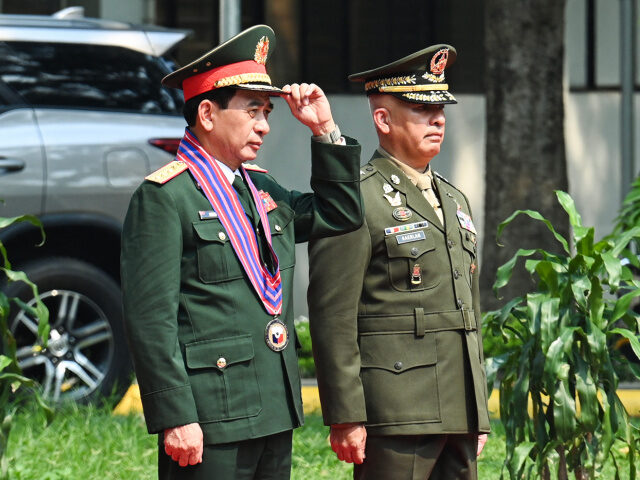The governments of the Philippines and Vietnam announced on Friday that they would sign a defense agreement that would expand their cooperation out of trade and into military and security projects, including “maritime” defense operations.
Philippine President Ferdinand Marcos, Jr., made the announcement while welcoming Vietnamese Defense Minister Phan Van Giang to Manila’s presidential palace, Malacañang, on Friday.
The neighboring countries have traditionally maintained cordial, if not necessarily friendly, relations, partially impaired by the Philippines’ status as a democratic U.S. ally and Vietnam’s as a communist tyranny. In the past decade, however, their diplomacy has improved in the face of the mutual threat presented by Communist China, which illegally claims significant chunks of both Vietnamese and Philippine territory in the South China Sea.
RELATED — China, No! Chinese Coast Guard Harasses Filipino Ship Leading to Boats Crashing
Jay Tarriela/PCG via StoryfulBeijing claims nearly the entire Sea, including maritime territory also belonging to the sovereign states of Taiwan, Brunei, and Malaysia, as well as waters off the coast of Natuna in Indonesia. The Chinese government has printed new false maps using a border for China known as the “nine-dash line” that severs entire island chains from their countries and gives them to China. When confronted about their false claims, Chinese officials incorrectly state that the territory in question has been Chinese “since ancient times.”
The Philippines sued China in international court over the claims, winning a case at the Permanent Court of Arbitration at the Hague in 2016. Beijing responded by insisting it would simply ignore the ruling and regularly engages in belligerent conduct against Philippine and Vietnamese fishermen and other sailors navigating in their own domestic waters.
President Marcos did not mention China explicitly in his remarks alongside Phan on Friday, instead emphasizing the diplomatic progress the two countries have made with each other. Notably, in addition to disputes over their territory with China, the Philippines and Vietnam both claim parts of the Spratly Islands, which China claims in their entirety. The two have apparently put their dispute aside in the face of the much larger threat from China.
“Your visit, I think, will serve as further impetus [to] depth and the range of our relationship,” the president said to General Phan, declaring the arrival of a “very significant point in the history” of their relations, according to the Philippine Star.
“We now talk about defense cooperation, security cooperation, maritime cooperation, and certainly, on the area of trade as well,” Marcos said.
Phan reportedly told Marcos that Vietnam is pleased with the “very good interactions and exchanges” it has had with Manila. “And we believe,” he said, “that as a responsible member of the ASEAN Community, the Philippines will further play a very active and dynamic role to contribute more to the ASEAN Community.”
ASEAN is short for the Association of Southeast Asian Nations, a regional political bloc.
Neither side has revealed any details in the defense agreement at press time. The Star reported that the disputes in the Spratlys have largely not been a matter of discord for Vietnam and the Philippines, as both have agreed to “hold discussions for a solution that will respect the sovereignty claims of both nations.”
Maritime concerns, particularly in the face of China attacking their ships in their waters, appear to be a paramount concern. The agreement on Friday follows joint military exercises by the Philippine and Vietnamese coast guards in early August and during a visit by Marcos to Vietnam in January, a discussion of expanding military cooperation.
Marcos returned to Manila with two key deliverables: an agreement to establish a direct communications hotline with the Vietnamese government and the development of a joint coast guard committee.
“The MoU (memorandum of understanding) on maritime cooperation is aimed at strengthening the understanding, mutual trust, and confidence between the two parties,” Marcos’s office said in a statement at the time.
Marcos did address the situation with China in a statement at the time of his trip to Vietnam, asserting that, while “peaceful dialogue” was on the table, the Philippines was “firm in defending our sovereignty, sovereign rights, and jurisdiction against any provocations.”
Vietnam agreed to the deal on Friday after a month of aggressive diplomacy to court its communist leadership by China and several significant incidents of violence against Filipino ships by the Chinese in disputed territory such as the Scarborough Shoal. Most recently, on Sunday, Chinese ships attacked Filipino aid ships attempting to bring food and medical supplies to fishermen, using water cannons to try to sink them.
Chinese state-run newspaper Global Times, which often acts as a mouthpiece for the communist regime, railed against Manila on Friday, claiming that its objections to having its aid ships attacked was a “ridiculous soap opera.”
“The Philippines has truly mastered the art of twisting the truth. It stirs up trouble in the South China Sea, escalates the situation, pushes it to the international stage, and then calls China the ‘biggest disruptor,'” the state propaganda outlet railed. “The Philippines’ provocations in the South China Sea under the incitement of the US will inevitably aggravate regional tensions.”
The Chinese government’s tone towards communist Vietnam has historically been much more diplomatic in response to the Vietnamese government prioritizing ties to Beijing. Vietnamese President To Lam made his first foreign visit since taking office a stop in Beijing on August 19, greeting dictator Xi Jinping and vowing loyalty to a fellow communist ally. To reportedly made the visit at Xi’s invitation. Last week, Lam sent Prime Minister Prime Minister of Vietnam Pham Minh Chinh to visit with Xi, reportedly seeking to discuss trade.

COMMENTS
Please let us know if you're having issues with commenting.